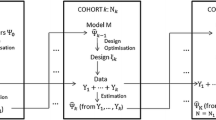Abstract
In some clinical development programs, there are potential biomarkers with promising but uncertain predictive effect, while the probability of success in the overall population cannot be readily dismissed. It is risky to focus only on the overall population, or just the biomarker subpopulation. In 2009, Chen and Beckman proposed a Bayesian decision framework to optimize the type I error rate (alpha) allocation in a Phase III clinical study with possible predictive subset effect. The utilization of internal data in this framework is of particular interest because it provides an opportunity to mitigate the potential risk of misspecified study assumptions using an auto-adaptive strategy. In this paper, we examine this auto-adaptive strategy in detail through extensive numerical case studies and provide guidance on the appropriate use of partial current trial (internal) data in this data-driven optimization framework. We show that internal data can be used to inform the alpha allocation to hypothesis testing in the overall population and the subgroup. The resulting adaptive testing strategy is robust with respect to the uncertainty in the predictive subgroup effect and biomarker prevalence.





Similar content being viewed by others
References
Kelly K, Altorki NK, Eberhardt WE, et al: A randomized, double-blind phase 3 trial of adjuvant erlotinib versus placebo following complete tumor resection with or without adjuvant chemotherapy in patients with stage IB-IIIA EGFR positive (IHC/FISH) non-small cell cancer: RADIANT results. ASCO Annual Meeting. Abstract 7501. Presented 2 June 2014
Tsao MS et al (2005) Erlotinib in lung cancer—molecular and clinical predictors of outcome. N Engl J Med 353:133–144
Yang CH, Yu CJ, Shih JY, Chang YC, Hu FC, Tsai MC et al (2008) Specific EGFR mutations predict treatment outcome of stage IIIB/IV patients with chemotherapy-naive non-small-cell lung cancer receiving first-line gefitinib monotherapy. J Clin Oncol 26(16):2745–2753
Sequist LV, Martins RG, Spigel D, Grunberg SM, Spira A, Jänne PA,. & Lynch, T. J. (2008) First-line gefitinib in patients with advanced non-small-cell lung cancer harboring somatic EGFR mutations. J Clin Oncol 26(15):2442–2449
Paez JG, Jänne PA, Lee JC, Tracy S, Greulich H, Gabriel S,. & Meyerson, M. (2004) EGFR mutations in lung cancer: correlation with clinical response to gefitinib therapy. Science 304(5676):1497–1500
Wang S, O’Neill RT, Hung HMJ (2007) Approaches to evaluation of treatment effect in randomized clinical trials with genomic subset. Pharm Stat 6:227–244
Freidlin B, Simon R (2005) Adaptive signature design: an adaptive clinical trial design for generating and prospectively testing a gene expression signature for sensitive patients. Clin Cancer Res 11(21):7872–7878
Friede T, Parsons N, Stallard N (2012) A conditional error function approach for subgroup selection in adaptive clinical trials. Stat Med 31:4309–4320
Mehta C, Schäfer H, Daniel H, Irle S (2014) Biomarker driven population enrichment for adaptive oncology trials with time to event endpoints. Stat Med 33(26):4515–4531
Brannath W, Zuber E, Branson M, Bretz F, Gallo P, Posch M, Racine-poon A (2009) Confirmatory adaptive designs with Bayesian decision tools for a targeted therapy in oncology. Stat Med 28:1445–1463
Jenkins M, Stone A, Jennison C (2011) An adaptive seamless phase II/III design for oncology trials with subpopulation selection using correlated survival endpoints. Pharm Stat 10(4):347–356
Simes RJ (1986) An improved Bonferroni procedure for multiple tests of significance. Biometrika 73(3):751–754
Spiessens B, Debois M (2010) Adjusted significance levels for subgroup analysis in clinical trials. Contemp Clin Trials 31:647–656
Chen C, Beckman RA (2009) Hypothesis testing in a confirmatory phase III trial with a possible subset effect. Stat Biopharm Res 1(4):431–440
Chen C, Li N, Shentu Y, Pang L, Beckman RA (2015) Adaptive informational design of confirmatory phase III trials for expedited development of personalized medicines. Stat Biopharm Res 8(3):237–247
Author information
Authors and Affiliations
Corresponding author
Rights and permissions
About this article
Cite this article
Shentu, Y., Chen, C., Pang, L. et al. Auto-adaptive Alpha Allocation: A Strategy to Mitigate Risk on Study Assumptions. Stat Biosci 10, 342–356 (2018). https://doi.org/10.1007/s12561-017-9192-1
Received:
Accepted:
Published:
Issue Date:
DOI: https://doi.org/10.1007/s12561-017-9192-1




